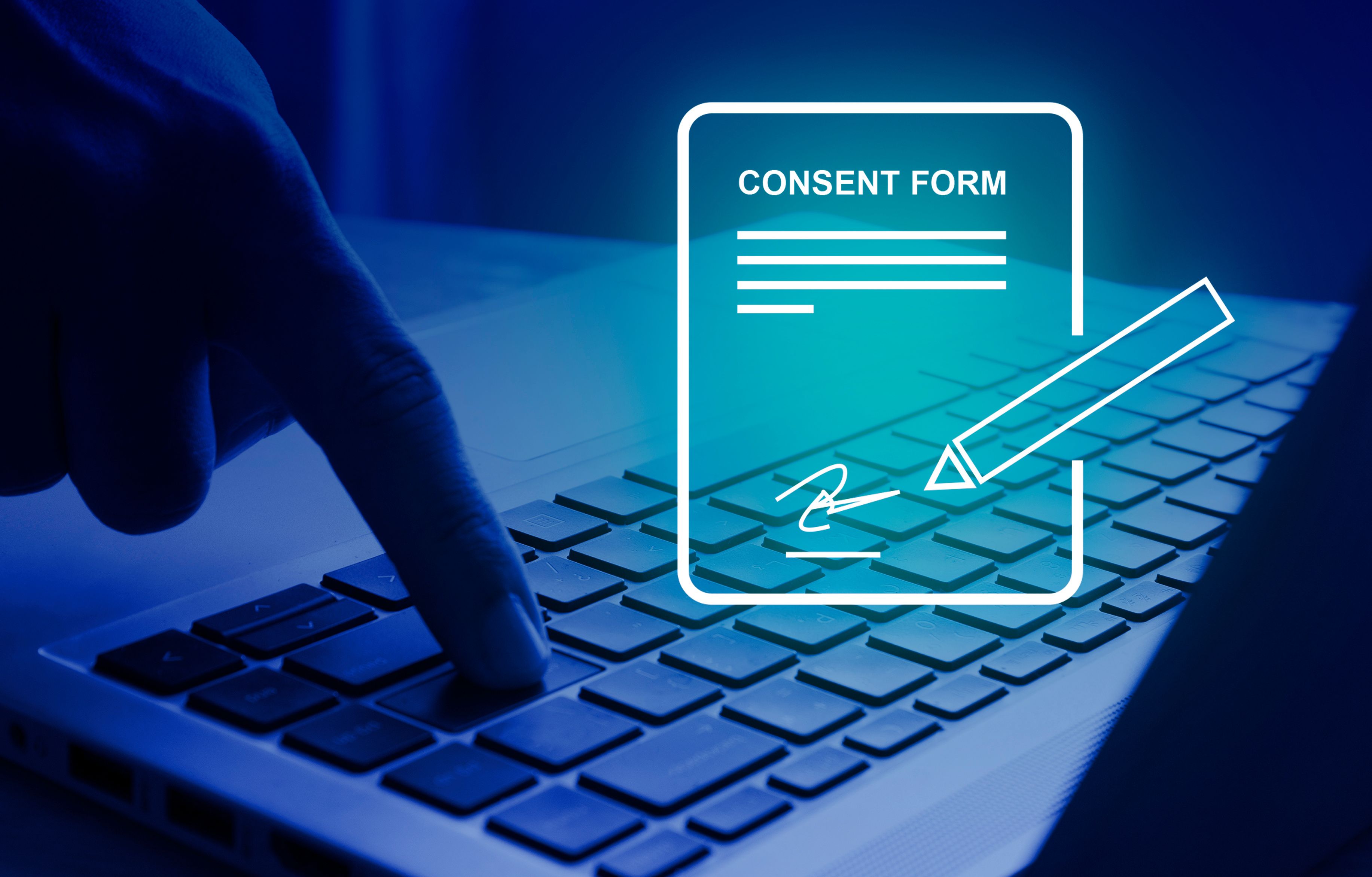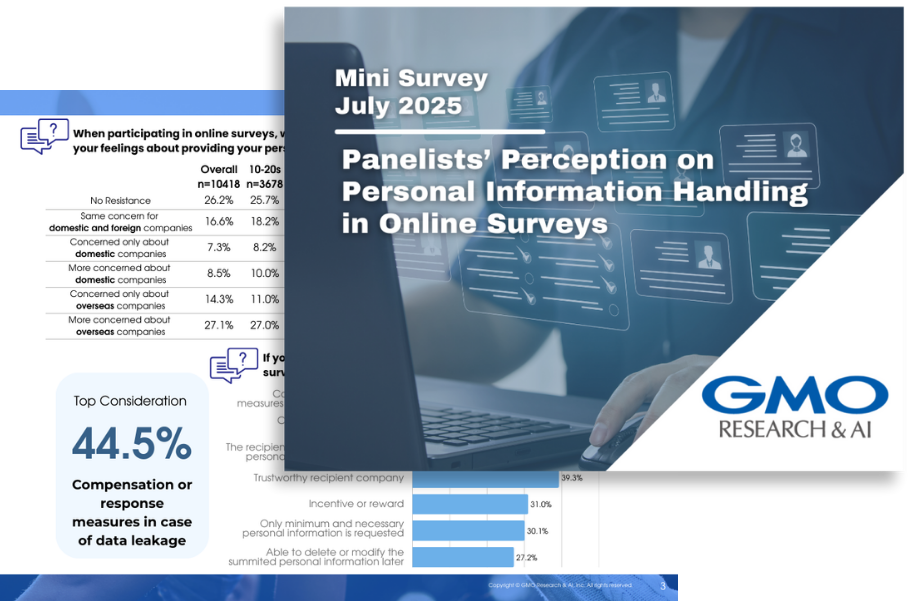Navigating Personal Information in Online Sampling: A Cross-Cultural Analysis of Privacy Attitudes in the U.S. and East Asia
2025/08/15

Table of Contents
- 1. Introduction
- 2. Survey Results: Panelists' Perception of Providing Personal Information During Surveys
- 3. Survey Results: Panelists' Key Conditions for Personal Information Sharing
- 4. Tips for Online Surveys Involving Personal Information
- 5. Regional Differences of Personal Information Protection Laws in East Asia
- 6. Research Projects Restrictions in East Asia
- 7. Get FREE Survey Report!
Introduction
As global expansion drives demand for data collection in Asian markets, research increasingly involves sensitive personal attributes and consciousness—often requiring personal information. Even in online surveys without explicit personal data requests, such information can surface in responses. Meanwhile, online survey participants are becoming more aware of who handles their data, where, and how, which may negatively impact data quality through inaccurate responses, mid-survey abandonment, or the provision of false information.
Understanding regional differences in attitudes and regulations is essential to ensuring effective and compliant research. This article examines those differences from two complementary angles: (1) our survey findings on how panelists from the U.S. and East Asia (China, Taiwan, South Korea) view sharing personal information, and (2) key local regulations and practical considerations for handling personal data during research fieldwork in East Asia.
Part 1: Survey Results on Cross-Border Personal Information Sharing
To understand how online survey participants feel about providing personal information internationally, we conducted a comprehensive research across the U.S., China, Taiwan and South Korea. The survey results reveal their key considerations for conducting surveys with personal information collection.
Survey Specifications
-
Survey Date: July 8-15, 2025
Method: Online survey
Target Group: Online survey participants
Region: United States, China, Taiwan, South Korea
Conducted by: GMO Research & AI
Attitudes Toward Domestic vs. Foreign Companies
Overall Trends
Across both the U.S. and East Asia, the majority of respondents (60-70%) expressed resistance to providing personal information to companies, regardless of whether they're domestic or foreign. However, significant regional differences emerged in the details.
The U.S. showed the highest percentage of respondents with "no resistance at all" (36.8%), while East Asian countries were comparatively more cautious: South Korea (31.5%), China (26.2%), and Taiwan (24.9%).
Notably, around 40% of East Asian respondents showed "greater resistance toward foreign companies" compared to domestic ones: Taiwan (36.8%), South Korea (43.3%), and China (41.1%). The U.S. showed lower resistance to foreign companies (27.3%).
*click on image to expand
Regional Breakdown
United States
- ・Higher proportion with "no resistance at all" (36.8%) compared to East Asia
- ・Lower wariness toward foreign companies (total 27.3%) than in other countries
- ・However, a significant portion (24.1%) still feels resistance toward both domestic and foreign companies
China
- "I feel concerned about both, but more so about foreign companies" was the most selected response (27.1%)
- A total of 41.1% showed greater concern about foreign companies
- Clear preference for domestic over foreign companies when sharing personal information
South Korea
- Lowest percentage showing greater wariness toward domestic companies (total 7.5%)
- Highest percentage (43.3%) expressing greater resistance toward foreign companies
- Most cautious approach to foreign company data sharing
Taiwan
- Most cautious stance overall toward personal information sharing
- Lowest percentage with "no resistance at all" (24.9%)
- Highest percentage selecting "same level of resistance toward both" (27.7%)
Key Conditions for Personal Information Sharing
Overall Trends
While regional preferences vary, "clear purpose of use" emerged as universally important across all regions. The U.S. places a stronger emphasis on company trustworthiness compared to East Asia, while China and Taiwan prioritize national-level data protection systems. East Asian regions (particularly China and South Korea) show heightened awareness of data breach response measures compared to the U.S.
Regional Priorities
United States
-
Company trustworthiness (48.5%) - highest priority, indicating brand power and corporate transparency significantly influence panel participation
-
Clear purpose of use (44.7%) and minimum necessary information collection (44.0%) also rank highly
China
-
Information leakage response measures (44.5%) - top priority, showing very high concern for personal information security management
-
Trust in national data protection systems also important (41.7%), requiring a clear demonstration of regulatory compliance
South Korea
-
・Clear purpose clarification (49.8%) - highest priority, making transparent communication about personal information handling crucial
-
・Information leakage response (41.1%) and minimum necessary information collection (40.1%) also highly valued
Taiwan
-
・Clear purpose of use (42.0%), recipient country protection systems (38.6%), and minimum necessary information collection (37.9%) are key priorities
-
・A higher percentage "unlikely to agree to provide personal information" (9.6%) compared to other countries, indicating a more reluctant segment exists.

Recommended Research Practices for East Asian Markets
Based on our findings, East Asian markets show more cautious attitudes toward personal information sharing in online surveys compared to the U.S., with notably higher resistance to foreign companies. To build participant trust, research design should incorporate the following adjustments:
Ensure Complete Transparency in Purpose
Since South Korea and Taiwan particularly value this, avoid ambiguous language when presenting research purposes at the survey launch. Be clear and concise.
Example: "This survey is conducted to gather consumer opinions for new product improvement."
Also, specify exactly how the collected information will be used.
Example: "The age and gender information you provide will be used solely for statistical analysis and will not identify individuals."
Clearly State Data Breach Prevention Measures
Chinese respondents show strong concern about leakage risks, and South Korean participants also express significant interest. Clearly present information security measures.
Examples: Explain specific breach prevention measures such as encryption, access restrictions, and outsourcing management.
Explicitly Communicate National-Level Regulatory Compliance
Since China and Taiwan emphasize national regulations, clearly state compliance with recipient country regulations and explain adherence to institutional requirements.
*Note: Cross-border personal information transfer may be strictly restricted in some cases, so consult thoroughly with local partners before implementation.
Partner with Local Panel Providers
To alleviate concerns about foreign companies, clearly state local information management systems and provide information about local subsidiaries or partner companies to enhance willingness to participate.
Part 2: Regulatory Differences and Country-Specific Considerations
While survey results reveal how attitudes toward personal information vary across regions, understanding the legal and operational realities is equally critical. In Part 2, we explore the regulatory frameworks in key East Asian markets and share practical insights from fieldwork—highlighting how regional differences in compliance requirements and data handling practices can shape the success of online surveys.
*Please note: The following regulatory information is provided for reference only to illustrate the importance of understanding country-specific differences. This is not legal advice.
Personal Information Definitions
Understanding the exact scope of “personal information” is the first step toward compliance. Different markets may define it in unique ways, which can influence survey design and data handling protocols.
Japan (APPI): Under Article 2 of the Personal Information Protection Act, it refers to "information that can identify living individuals (names, birthdates, email addresses, etc.)." The 2022 revision introduced categories of "special care-required personal information" (race, health, beliefs, etc.) and "personal-related information" (IP addresses, cookies, device IDs, etc.), requiring individual consent for specific provision.
South Korea (PIPA): Korea's Personal Information Protection Act defines "personal information" as "information that can identify living individuals" or information identifiable through cross-referencing with other data, including names, images, fingerprints, location information, and sensitive information about health and beliefs.
China (PIPL): China's Personal Information Protection Law defines personal information as "any kind of information related to identified or identifiable natural persons," broadly covering names, ID numbers, location, communication history, financial information, health information, and biometric information. Sensitive Personal Information (SPI) specifically includes biometric authentication data, religious beliefs, medical/financial/location history, and information about minors under 14.
Opt-In as the Standard Consent Mechanism
Unlike in the U.S., where many federal laws adopt opt-out approaches (e.g., CCPA-style guidance from the Department of Commerce), many East Asian markets require explicit opt-in before collecting personal information.
Japan: For general personal information (names, etc.), provision is possible through notification and opt-out. However, post-revision special care-required personal information and personal-related information require explicit opt-in consent for third-party provision.
South Korea: PIPA requires explicit opt-in consent for all collection, use, and third-party provision. Exceptions are only permitted when explicitly stated by law.
China: PIPL requires opt-in consent for all personal information processing. Sensitive information, third-party provision, and cross-border transfers require separate consent as explicitly stated in the law.
Strict Cross-Border Transfer Regulations
The regulatory landscape becomes particularly complex for cross-border data transfers, with South Korea and China having the strictest regulations in East Asia regarding cross-border and sensitive information handling.
Japan: Special care-required and personal-related information is of high importance, requiring explicit opt-in consent for third-party provision. For cross-border transfers, adequacy recognition exists only with the EU and UK; other destinations require individual consent or sufficient alternative measures (contracts, etc.).
South Korea: PIPA is very strict regarding the handling of sensitive and unique identification information. Cross-border transfers require individual consent and, in some cases, application to and approval from supervisory authorities (PIPC).
China: PIPL requires security assessments and separate consent for cross-border transfers, with potential transfer prohibitions from national security perspectives in severe cases. Businesses handling significant amounts of information face biennial re-evaluation and reporting obligations.
Restrictions for Projects Involving Personal Information
Projects that handle personal information can face strict legal and operational constraints, based on the regulations explained above. In most APAC countries, similar to the U.S., personal information collection in quantitative research (not limited to panel members themselves, but including family and acquaintances) is generally restricted.
For example, in China, new personal information laws in 2024 have made companies very cautious about providing personal information of their own service users. In South Korea, recruitment may be prohibited even for domestic-only projects, depending on the purpose.
Some panel partners completely prohibit surveys involving personal information collection and are extremely cautious about personal information handling. However, exceptions may be permitted in compliance with regulations, so consultation with specialized local panel providers is recommended.
Conclusion
The research landscape for personal information collection varies significantly across the U.S. and East Asian markets. Success in these regions requires understanding not only regulatory differences but also cultural attitudes toward privacy and data sharing.
Key takeaways for researchers planning studies in East Asian markets include:
-
・Prioritize transparency in all communications about data use and purpose
-
・Implement robust security measures and communicate them clearly to participants
-
・Ensure regulatory compliance and explicitly communicate adherence to local laws
-
・Partner with local experts who understand both regulatory requirements and cultural sensitivities
By respecting participants' personal information and maintaining high engagement standards, researchers can achieve better data quality while building trust. Success in Asia’s diverse markets requires a panel partner with deep local expertise and an understanding of each country’s unique regulations.
At GMO Research & AI, we specialize in navigating APAC’s complex research landscape—helping you stay compliant, protect respondent trust, and achieve impactful insights. Contact us to leverage our extensive panel network and expertise across the region.

Customize your online research in APAC

